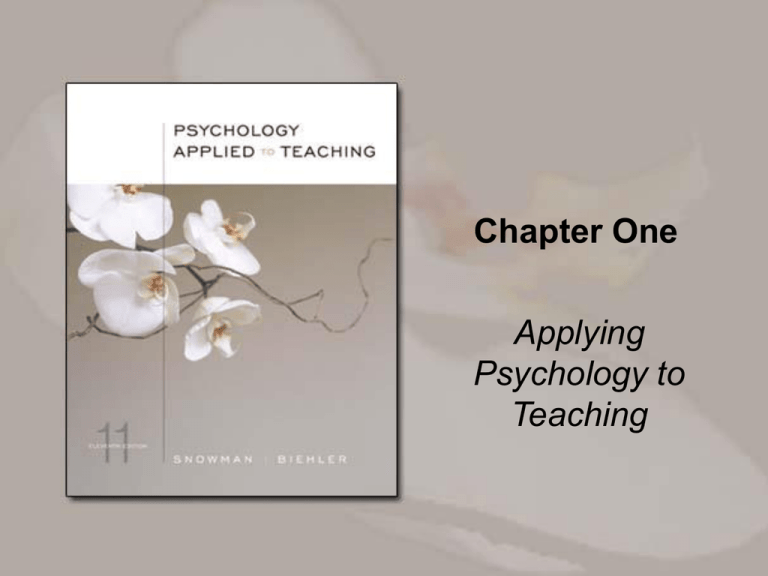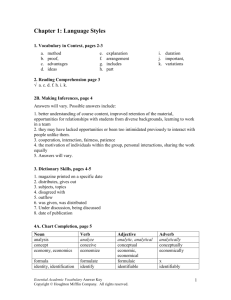
Chapter One
Applying
Psychology to
Teaching
Overview
• What is educational psychology?
• How will learning about educational psychology help
you be a better teacher?
• The nature and values of science
• Complicating factors in the study of behavior and
thought processes
• Good teaching is partly an art and partly a science
• Reflective teaching: A process to help you grow from
novice to expert
Copyright © Houghton Mifflin Company. All rights reserved.
1-2
What is educational psychology?
• Educational psychology is …
• “A scientific discipline that is concerned
with understanding and improving how
students acquire a variety of capabilities
through formal instruction in classroom
settings” (p. 4).
Copyright © Houghton Mifflin Company. All rights reserved.
1-3
How Will Learning About Educational
Psychology Help You Be a Better Teacher?
• Teaching is a complex enterprise
– Educational psychology provides information
about a wide range of knowledge and skills
• Research that informs teachers
– Educational psychology offers useful and
tested ideas for improving instruction
• Coursework and competence
– Educational psychology helps prepare
teachers to be effective
Copyright © Houghton Mifflin Company. All rights reserved.
1-4
Teaching is a Complex Enterprise
• Professional teaching standards have been
developed and are based on five propositions:
– Teachers are committed to students and their learning.
– Teachers know the subjects they teach and how to
teach those subjects to students.
– Teachers are responsible for managing and monitoring
student learning.
– Teachers think systematically about their practice and
learn from experience.
– Teachers are members of learning communities.
(National Board for Professional Teaching Standards, 1994)
Copyright © Houghton Mifflin Company. All rights reserved.
1-5
Research in Educational Psychology
Informs Teaching
• Examples:
– Use more advanced students to tutor less advanced students
– Give positive reinforcement and corrective feedback to
students
– Communicate to students about expectations
– Require students to respond to higher-order questions
– Provide students with cues about the upcoming tasks
– Teach students how to monitor and improve their own learning
efforts
– Know students’ misconceptions
– Create learning situations where students customize
information and problems for themselves
– Accept responsibility for student outcomes
– Show students how to cooperate
Copyright © Houghton Mifflin Company. All rights reserved.
1-6
The Nature and Values of Science
Unsystematic observation
Vs.
Systematic observation
Copyright © Houghton Mifflin Company. All rights reserved.
1-7
Complicating Factors in the Study of
Behavior and Thought Processes
• The limited focus of research
• Debates about which type of research is
most useful
• Individual differences in perception and
thinking
• Selection and interpretation of data
• New findings mean revised ideas
Copyright © Houghton Mifflin Company. All rights reserved.
1-8
Good Teaching is Partly an Art
and Partly a Science
• Teaching as an art
– Beliefs, emotions, values, flexibility
• Teaching as a science
– Usable body of research findings
Copyright © Houghton Mifflin Company. All rights reserved.
1-9
Reflective Teaching
• Reflective teachers possess:
– An introspective orientation
– An open-minded but questioning attitude about
educational theories and practices
– The willingness to take responsibility for your
decisions and actions
Copyright © Houghton Mifflin Company. All rights reserved.
1-10
Ways to Become a Reflective Teacher
• Use the Suggestions for Teaching from each
chapter to gather ideas.
• Try the Suggestions out in your teaching.
• Use the Journal Entries from each chapter to help
guide observation notes of yourself and your
students.
• Analyze the observation notes for strengths and
weaknesses.
• After each teaching episode, think about and/or
write down an assessment of how you did.
Copyright © Houghton Mifflin Company. All rights reserved.
1-11

